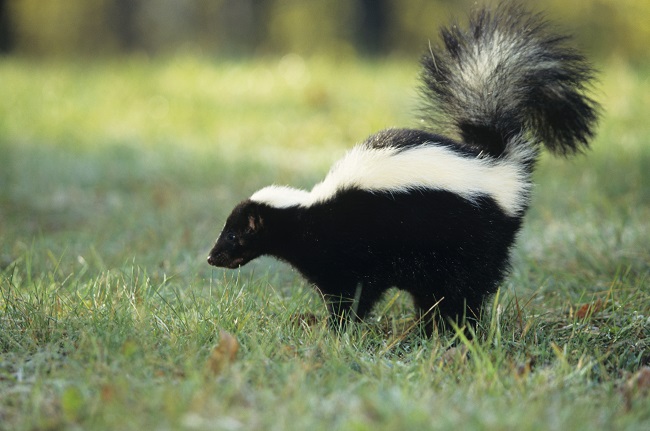
Skunks tend to live as close to a food source as possible, so be careful to not inadvertently provide food sources for them. Skunks eat insects, grubs, garbage, bird seed, fruit, vegetables, and small mammals.
In residential area skunks usually make a home under a garden shed, in a wood pile, a rock pile or in a ditch. Skunks are nocturnal and are rarely seen during the daytime hours.
Skunks mate in late winter and early spring with a gestation period of 63 days. A litter of skunks can be as few as two or as many as ten babies. The babies are usually born in late April or early May and will remain with the mother all summer long. They finally leave home in the fall.
Skunks foraging for food can do a lot of damage to your lawn digging up several clumps of grass at a time or rolling back large areas of sod. Skunks really like Japanese Beetle grubs so if you have a skunk doing considerable damage to your lawn chances are you have a grub problem, and the grubs are quietly doing as much if not more damage to your lawn.
Treat your lawn with a grub control product to eliminate Japanese Beetle grubs. Skunks love fruit that has fallen to the ground so keep the area under fruit trees raked up.
Fence in your vegetable garden, skunks are poor climbers and won’t be able to scale the fence. However, they can dig under the fence so bury the fence about 12″ deep in the ground.
If you suspect you have a skunk under a shed or in a wood pile you have a few options. You can catch them in a live trap, but in most states it’s illegal to relocate them because they carry rabies and other diseases. Consult with your local animal control office for advice in this area. Skunks are easy to trap because they will go to great lengths to find foods with a strong aroma like peanut butter or bacon.
Use a trap designed for skunks so they don’t have enough room in the trap to get into a spraying position.
Another option is to make them feel unwelcome. Skunks do not like bright light. I’ve heard of people shining bright lights under the shed and or playing talk radio for
them. However, lights are a fire hazard and an electrical shock danger. Skunks also do not like the smell of humans. Some people have had success with waiting until the skunks leave for the night and then filling their den with smelly socks and other dirty clothes. Leaving human hair in their den is another thing that infuriates skunks. If you can fill their den with enough human smells, the skunks might just up and leave to find another home.
The better option is to wait until the skunk has left the den and then you can seal the den off with wire screen that closes off the opening and is buried at least 12″ into the ground. Skunks typically come out at dusk and stay out most of the night. Think about the timing of your efforts. From May until late August there could be young in the den all night long.
Not sure if the skunk has left yet? During the daytime sprinkle baking flower around the area then you can check for tracks after dark and know that the skunk is out and about.
Mike McGroarty is the owner of McGroarty Enterprises and the author of several books. You can visit his website at FreePlants.com and read his blog at MikeBackYardNursery.com.
Related Articles & Free Email Newsletter
How to Create a Garden That Attracts Birds
How to Keep Cats Out of Your Garden




Comment here